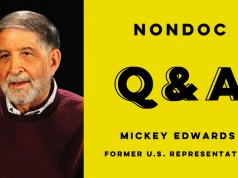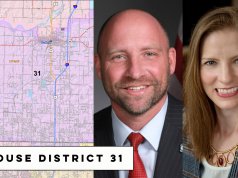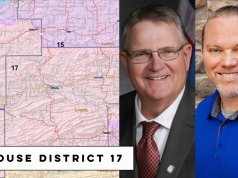The presidential election is 35 days away from this writing, and candidates are doing everything in their power to convince voters to vote for them. This includes trotting out the same old saw that voting for a third-party candidate is a “wasted vote,” or, more ominously, a vote that will enable your least favorable candidate to win the election.
In fact, the New York Times ran a story earlier in September discussing the Clinton campaign’s new push to basically guilt millennials inclined to vote for Libertarian Gary Johnson or Green Party candidate Jill Stein into voting for Mrs. Clinton. Whether or not this is effective remains to be seen.
But this question of whether a vote for someone other than a Republican or Democrat candidate is a wasted vote continues to trouble some voters.
In fact, I was sitting on a panel discussion sponsored by the University of Central Oklahoma’s political science department in late September, and one of the questions was from a young female millennial who wanted to know if voting for a third-party candidate was wasting her vote.
Express yourself
Let me start with this premise: No candidate — Republican, Democrat or any other party — is inherently entitled to your vote. The right to vote is a precious thing. It’s something many people have fought (both literal wars and political fights) to obtain and protect. It should not be given lightly to any candidate. Candidates should earn your vote, not assume it belongs to them.
Beyond that, your vote is an expression of who you are. What values you believe in, and what you believe is truly best for the country. Casting a ballot for your “next best alternative” or for the candidate that you believe can win is what leads us continuously to the situation of voters feeling as they are voting for the lesser of two evils. And most people are tired of that way of voting. In addition, candidates who earn your vote simply because they are more likely to win are, if elected, significantly less likely to truly represent you.
Furthermore, in the presidential election, because of the nature of the Electoral College system, a vote for any candidate but the winning candidate in most states could be called a “wasted vote.” In all but Nebraska and Maine, the candidate who wins the popular vote in a state will win all of that state’s electoral votes. This winner-take-all system means that if Hillary Clinton wins Ohio 50.5 percent to 49.5 percent, all those voters in the minority just wasted their votes, as they will have no representation in the Electoral College.
Cast with care
So consider Oklahoma and the presidential election. The majority of voters in this state have not expressed a preference for a Democrat candidate for president since 1964. There is no indication this will change in 2016. Therefore, it could be argued that any vote not for the Republican candidate is a wasted vote in this state. In fact, those inclined to vote for Libertarian Gary Johnson — the only option on the ballot other than the Democrat or Republican candidates — could make the case that a vote for Johnson would actually accomplish something, whereas a vote for Clinton will not.
Should Johnson receive 2.5 percent of the total ballots cast for president, the Libertarian Party will remain a third option available to Oklahoma voters in future elections. In this sense, voting for the Democrat presidential candidate in Oklahoma is the “most wasted” vote one can cast this election season.
None of this is to say you should or shouldn’t vote for any particular candidate. What it really demonstrates is that no vote is wasted. Rather, all votes express a particular voter’s hopes, beliefs and policy preferences.
Finally, remember, there are many other candidates and issues on the ballot besides the presidential election. In all of these, your vote matters. There’s no Electoral College involved with these, so express yourself. Vote for the candidate who inspires you, the candidate who reflects your hopes and desires. If that candidate doesn’t exist, then your next best option might be a candidate to consider — or not voting might be something to think about as well.
Remember: No candidate is entitled to your vote. Cast it with care.























